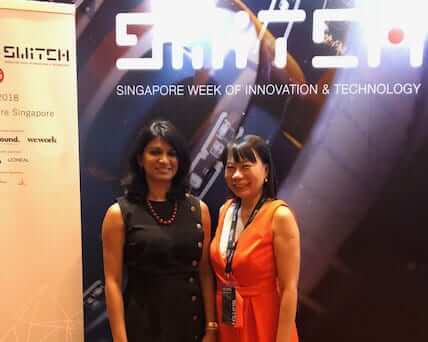(Women on Top in Tech is a series about Women Founders, CEOs, and Leaders in technology. It aims to amplify and bring to the fore diversity in leadership in technology.)
Here is my interview with Nidhi Gupta, CEO and Co-Founder of Portcast Pte Ltd – an AI startup that predicts cargo flows, by combining external real-time datasets (market signals including economic indices, climate data and satellite-based data), historical data and machine learning, to help logistics companies predict cargo flows accurately. Nidhi is an experienced strategy and logistics professional with a decade of leadership and C-level consulting experience in Asia Pacific with the Deutsche Post DHL group. Nidhi holds an MBA from the Indian Institute of Management in Bangalore and Bachelors in Computer Science Engineering.
What makes you do what you do?
Every single day is fulfilling. That’s why I’m building Portcast and able to manage the zillion tasks that building a company entails. I believe that the technology we are developing will lay the foundation for digitisation in the maritime and logistics industry. With every customer interaction, I feel a small step in change management and rethinking the decade-old ways of working. With every new person joining the team, I feel a step change in what we’re able to achieve and the culture we develop. And all that direct impact is what makes me motivated.
How did you rise in the industry you are in?
I started my career in management consulting, moved on to strategy and business development and then decided to take the leap of starting my own venture. I believe three key reasons have helped to build my career:
- Merit-based systems: I believe I was part of organisations that followed merit-based systems, which meant that clear performance goals had to be met to succeed and that’s a value that I try to bring to my own startup now as well.
- Continuous learning & mentorship: One of the early learnings I took away was that feedback should be seen as a “gift”. If someone is giving you feedback and improvement suggestions, the person is going out of his/her way to help you improve. I’ve definitely grown as a professional and an individual, with the feedback and continuously improving my skills.
- Believing that “Your career is in your hands”: Ultimately, we all need to know that we build your own career path. We need to have a vision or a dream and define the path that could possibly take us there. And this may require taking some risky or bigger leaps of faith.
Why did you take on this role/start this startup especially since this is perhaps a stretch or challenge for you (or viewed as one since you are not the usual leadership demographics)?
As I was in senior roles in the logistics industry working with customers and senior business leaders, I saw companies like Amazon changing their entire warehouse architecture with Kiva robots while traditional logistics companies had to take smaller steps of innovation or wait for the customer to co-fund such radical changes. There I saw a great opportunity in the logistics industry, with the role that technology and startups can play – given their agility and speed. After a decade in corporate life in diverse leadership roles, I believe I had the necessary skills required to take on such a role of leading my own company. It takes courage, family support, and some amount of madness to take that risk. And it has been extremely fulfilling so far!
While at beginning of the Entrepreneur First program, it was hard to fit in with the incredible technical talent and convince them of the value that a business person like me could bring to a company. But midway through the journey, I believe many of them realised that value through the way I engaged with customers or created business plans. It was about how you carry yourself and how you keep the vision.
Do you have a mentor that you look up to in your industries or did you look for one or how did that work?
Absolutely. I believe that at every level in my career, I was able to find a mentor who I could trust and get advice from. A mentor need not be an official role. I looked for mentors who were comfortable in their shoes i.e. they had achieved significant milestones in their careers and were confident enough to be able to advise me based on what I wanted to achieve or develop my skills on, regardless of whether that fits into the organizations’ goals or not.
How did you make a match if you did, and how did you end up being mentored by him/her?
For me, it was important to find a mentor within the industry or company that I was in. This helped me feel that the mentor can understand the challenges that I’m facing and how I could develop further my skills and grow into the organization/industry. Key factors that were important to me in a mentor were honesty and empathy in terms of the feedback and discussion with me; and stability in their own position to avoid any conflict of interests. It is not necessary to officialise the ‘role’, rather it is important to have a personal connection with the mentor, meet at regular intervals, be able to confide and ask for advice in specific situations.
One of the issues research has shown is that women do not explicitly mention their achievements and are taught culturally not to shine too brightly, what is your experience of this?
That’s true. It is hard to speak of oneself and take credit. Women usually feel that it’s just normal to do something right. While men are able to market themselves much more. We need to take ownership of our value proposition and build our brand better.
And how did you overcome your challenge to shine brighter?
I am still overcoming. As women, we need to be able to take credit where it is due and culturally Asians are generally not taught to talk about themselves. So I think it takes time. When I started my career I was quieter and doing my work and then slowly you realise you have to speak up, you have to voice your opinion and make yourself heard. And what helped was a strong feedback culture in the first team I was part of, where it was about coaching you and motivating you to do the right thing
Now as a leader how do you spot, develop, keep, grow and support your talent?
People are the biggest asset for any startup. Based on the last one year of hiring and managing talent, I believe the key to spot good talent is to not focus on the degree or the school where the candidate is from, rather, it has to do with the challenges the person has experienced and how they’ve overcome the same, the level of ambition, and whether they have exhibited passion in the profile they want to apply for. In today’s information age, knowledge and resources are so easily available. If a candidate has taken the time to go out of the school curriculum and learn skills related to programming or machine learning, then he/she would be the right fit for our team regardless of the degree, school rank or the candidate age!
Secondly, once on-board, every single person, regardless of full-time or intern, is treated with the same respect and entrusted with high levels of performance. We make sure that the expectations of each individual are understood when they enter the company so that we can try to meet the same, and provide the experience that they came to Portcast for. And we follow a culture where everyone is expected to voice out their opinion, contribute, and help the company and product develop and grow.
Do you consciously or unconsciously support diversity and why?
We have supported diversity from the start in our company. We’ve had people in the company who have excelled and contributed regardless of their gender, preferences, nationalities, age or religion – and that starts from the leadership. I do think that this is unconscious, which is good, as when hiring, we don’t let any bias drive our decision making. And eventually, we realised how diverse a team we are.
What is your take on what it takes to be a great leader in your industry and as a general rule of thumb?
A great leader, in my opinion, is able to create a dream and convince the team to join him/her in reaching the dream, and is then able to lead by actions. Especially in a young startup, the culture of the company is built by the founders and the way the founders behave, that will decide how the team will follow.
Advice for others?
I feel there are many like me who are still procrastinating whether to take the jump into starting your venture or not. I’d advice that as long as you have your basics covered and you know the reasons “why” you want to start a venture clearly in your mind, there’s always the right time to start now!
Also, being a female entrepreneur, I have only had positive experiences to date. So, we need to give more confidence and build a support system for every next woman who’s looking to be a tech entrepreneur. I’d be more than glad to give back and mentor anyone who’s in a similar journey and could benefit from sharing their challenges.
The next 12-18 months for Portcast involve building the core data science and software development team, launching the product and growing with our customers. If there are any software developers out there, looking to join a fast-paced tech startup, happy to guide and connect!
If you’d like to get in touch with Nidhi Gupta, please feel free to reach out to her on LinkedIn: https://www.linkedin.com/in/nidhi-gupta-1291a05/
To learn more about Portcast, please click here.





























